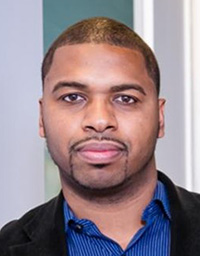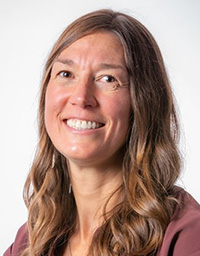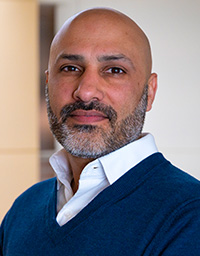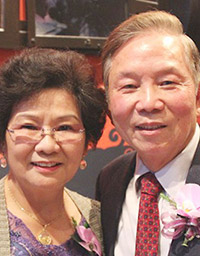Embracing the Power of Diversity, Equity and Inclusion (DEI)
Hakim Weatherspoon, B.S. 1999 Computer Engineering
Professor; Associate Director, Cornell Institute for Digital Agriculture, Cornell University; Co-Founder and Chief Scientist, Exostellar, Inc

A Husky football player, entrepreneur and professor, Hakim Weatherspoon has never limited himself academically or professionally – and he strives to provide the same limitless opportunities to his students. Throughout his more than 15 years as a faculty member at Cornell, Weatherspoon has helped to create innovative university and communal programs that guide underrepresented computer science students through their educational journey, ultimately diversifying the field.
After receiving his bachelor’s in computer engineering from the University of Washington, Weatherspoon completed his Ph.D. at University of California, Berkeley before undertaking post-doctoral research at Cornell University. Joining Cornell’s faculty in 2008, Weatherspoon identified a lack of educational and interpersonal support for underrepresented students and has spearheaded numerous initiatives aimed at bridging these gaps. Rather than focusing on a single pivotal year, Weatherspoon designed broadly scoped programs that students could join in their first year as an undergraduate, with support through the last year of graduate school. Programs CSMore for rising sophomores in computer science, SoNIC Summer Research Workshop for underrepresented students pursuing PhDs in computer science, and the Underrepresented Minorities in Computing undergraduate and graduate student groups – complemented by Weatherspoon’s own mentoring – create a supportive academic community that enables students to succeed. This demonstrated commitment to supporting a diverse student body led to his appointment as Cornell’s Computer and Information Science Associate Dean for Diversity and Inclusion in 2020, and re-appointment again in 2024 after his sabbatical and leave with his startup, Exostellar.
Weatherspoon’s impact extends nationally through his involvement with the LEAP Alliance, a partnership between the UW, Cornell and other universities aimed at diversifying computer science Ph.D. programs. Internationally, he organized CodeAfrique hackathons, engaging more than 500 students in Ghana and Eswatini. And his influence reverberates beyond Cornell, inspiring similar programmatic models at organizations like ColorStack. With passion and dedication, Weatherspoon is helping to create a space for all students in the field of computer science.
Creating a Healthier and More Just World
Stephanie Bostwick, B.S. 2005 Aeronautics & Astronautics; M.S. 2007 A&A
Engineering Department Chair, Northwest Indian College

Solar microgrids are localized electric grids that can operate independently from main power grids, unlocking opportunities for energy self-sufficiency while improving sustainability and combating climate change. Stephanie Bostwick is harnessing the potential of solar microgrids – bridging renewable energy practices, government relations and Indigenous knowledge – in her mission to create engineering educational programs and initiatives that uplift Indigenous communities.
After receiving her B.S. and M.S. in aeronautics and astronautics from the University of Washington, Bostwick worked for Raytheon and other aerospace companies before redirecting her focus to engineering education for Native students. As a member of the Blackfeet tribe, she wanted to empower students to bring change into their communities. She became a professor at Northwest Indian College (NWIC) and created their first A.S. engineering program. Through her partnerships with educational, Tribal and government groups, she highlights the potential of microgrid technology and energy independence using hands-on solar kits, rooftop solar training programs, and developing vocational and 4-year degree programs for her students. Her innovative curriculum directly supports the Lummi Nation, on whose land NWIC is located, in their goals for energy self-sufficiency and combating climate change.
Beyond NWIC, Bostwick is also a program manager at the National Renewable Energy Laboratory and the Tribal Colleges and Universities Coordinator at the Department of Energy’s Office of Indian Energy. In this role, she is working to ensure all TCUs have access to clean energy workforce training as well as infrastructure funding for their campuses. Her leadership across sectors has made her a trusted advisor for government-Tribal programs aimed at future renewable energy projects. Her thoughtful approach to collaboration and her dedication to equity have provided a blueprint for how institutions and agencies can intentionally and respectfully partner with tribal communities in their endeavors. By merging principles of sustainability with cutting-edge technology, she equips generations of engineers with the tools to sustainably power their communities. From academic programming to industry collaborations, Stephanie Bostwick has enhanced human health and well-being through clean energy deployment.
Translating Innovation into Impact
Shivang Dave, Ph.D. 2011 Bioengineering and Nanotechnology
CEO and Co-founder, PlenOptika, Inc.

Passionate about leveraging technology to address global healthcare disparities, Shivang Dave has made a significant impact on vision care innovation. Ranked in the top 10 global health challenges, uncorrected vision remains a worldwide health burden not due to the inaccessibility of corrective eyeglasses, but rather the challenge of testing people for prescriptions. Dave, with his co-founders and team, developed technology with the potential to enable vision exams for more than one billion people unable to access care today.
After graduating from the University of Washington, Dave received a Madrid-MIT M+Visión Fellowship, where he and his colleagues discovered the innovation opportunity and prototyped the device that would become the basis for their startup PlenOptika, which they co-founded in 2014. Dave and his co-founders developed an easy-to-use, low-cost device that measures refractive errors with clinical quality, aptly named QuickSee. This hand-held device uses advanced optics and algorithms to instantaneously measure the aberration pattern of the human eye and convert it into a conventional eyeglass prescription. QuickSee has helped vision care professionals to correct vision for more than 5 million people in 45 countries, in high- and low-resource settings alike, since it was commercialized in 2019, and has been the only autorefractor selected for NASA space health research.
As PlenOptika’s CEO, Dave has led the company from a small startup to an industry visionary, fostering commercial, academic and public health partnerships that drive research and enable new care delivery models in vision health. Dave’s commitment to leveraging science, technology and entrepreneurship to create impact extends beyond his success in business, to transforming vision health and enhancing the lives of millions globally.
Dean’s Award
Paul Bao-Ho Liao, Ph.D. 1972 Civil & Environmental Engineering
Chairman and CEO (past), KCM Inc.
Mei-Yea Chiou Liao
Community Leader

With a lifelong appreciation for the transformative power of education, Paul Liao and his wife Mei-Yea Liao have demonstrated a broad commitment to community and educational impact across generations.
From his humble upbringing on a farm in Taiwan, where he walked an hour, barefoot, to attend school, Paul became the first in his family to receive a college degree and achieved worldwide recognition for his groundbreaking research in water treatment for fish farming aquaculture. Armed with an environmental engineering degree from National Cheng Kung University, Paul began his career with Taiwan’s Public Works Bureau, partnering with the World Health Organization on a water supply project. During this time, he also crossed paths with Mei-Yea, who became his lifelong partner. In 1967, the couple arrived at the University of Washington so Paul could pursue his graduate studies. As a Ph.D. student, Paul joined KCM Engineering and led a hatchery water reconditioning project that ultimately set the standard for water treatment practices, advancing global seafood production.
The eldest of seven children, Mei-Yea graduated from Shih Chien University and worked as a personnel officer at Taiwan Power Company before immigrating to the U.S. She then helped all her siblings relocate to the US and thrive in a new country, while working hard to ensure her three children received the best education possible. A highlight of her U.S. work experience was teaching Taiwanese and Mandarin-style cooking to more than 2,000 students at the Oriental Cooking School in the University District in the 1970s-80s.
Paul worked his way up to chairman and CEO of KCM Engineering before the company was acquired by Tetra Tech in 1995. His achievements helped to shape aquaculture and fisheries work in the Pacific Northwest and around the world. Paul credited much of his success to his education and to Mei-Yea’s support.
Paul and Mei-Yea pledged to give back to society, demonstrating early appreciation for community through support of the Taiwanese church in Seattle. The core focus of their philanthropy has been creating educational opportunities for others, including a Regental Fellowship in Paul’s home department of Civil & Environmental Engineering that fosters an exchange with National Cheng Kung University. They also supported local and national healthcare, social services and cultural organizations.
After Paul and Mei-Yea’s son Darwin passed in 2013 and Paul passed in 2018, Mei-Yea and the couple’s daughters Darlene and Dahlia, both UW grads, chose to honor Paul and Darwin’s memory with one of the first significant gifts to the College of Engineering’s Interdisciplinary Engineering Building campaign. This legacy ensures that future UW Engineering students receive a leading-edge educational experience, underscoring the enduring impact of the family’s commitment to learning.